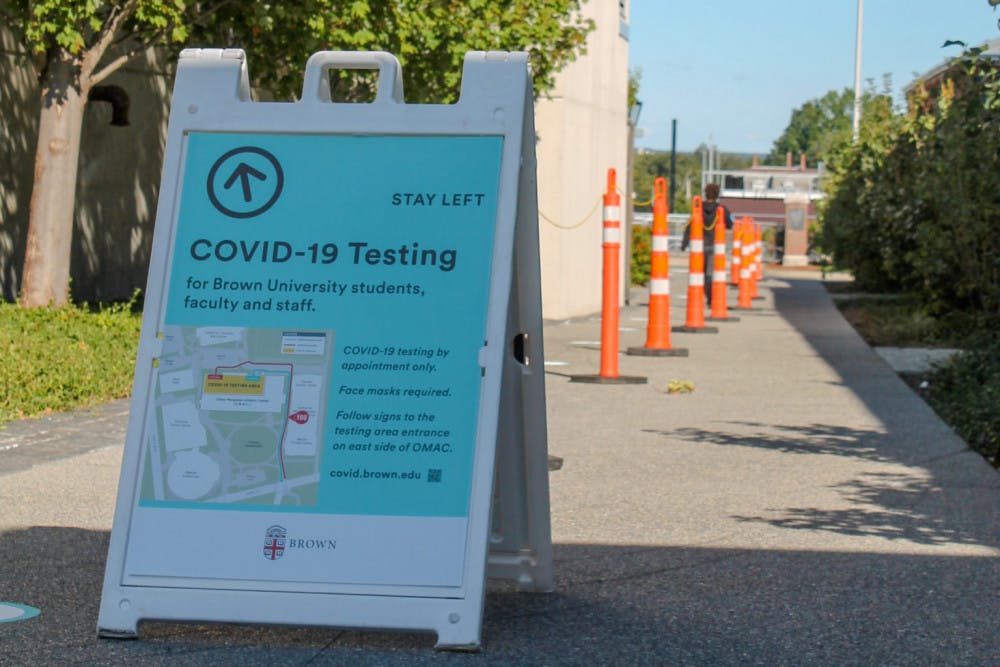Twenty-seven community members tested positive for COVID-19 through the asymptomatic testing program between March 25 and March 31, according to the Healthy Brown COVID-19 Testing Update April 2. The Healthy Brown COVID-19 Dashboard is currently out of service in response to a cybersecurity attack March 30, The Herald previously reported.
The shutting down of the University’s information systems and networks has not affected COVID-19 test scheduling and results, which are managed by Verily, Executive Vice President for Planning and Policy Russell Carey ’91 MA’06 told The Herald in a conversation April 2.
Similar to last week, “individual choices” are causing positive test results, and the largest share of cases are coming from on-campus students, Carey said. But both symptomatic and asymptomatic positive cases are fewer than the previous week, which is “encouraging,” he added.
Rhode Island opened 12,000 new appointments Friday, offering COVID-19 vaccines to residents ages 60 and above, as well as to those between the ages of 16 to 64 with underlying health conditions. The state expects “to create a new eligibility group on Monday, which would be 50 and up,” and all adults will be eligible for the vaccine April 19, Carey said.
Since the final move-out day for the semester is April 24, many students who become eligible April 19 in R.I. will soon after be departing from campus to other states and countries. The University has generally advised students to get the vaccine “as soon as (they) can … but that timing, given where we are in the semester, I understand is challenging,” Carey said.
For students leaving campus, “they’re probably better off getting (the vaccine) where they're going,” especially considering the Moderna and Pfizer vaccines which require two doses administered roughly two weeks apart, he said.
Residents in certain zipcodes in the state that have been hardest hit by the virus have become eligible for the vaccine regardless of their age, Carey said. In response to University community members falsely claiming to be residents of these zipcodes to receive vaccines, Carey hopes “people will follow the eligibility rules and understand that when city and state leaders have made decisions like that, it’s to prioritize people who need it the most,” he said.
All community members authorized to be on campus during the summer — including enrolled students and students conducting research — will be required to continue their enrollment in the University’s asymptomatic testing program and adhere to COVID-19 safety guidelines, Carey said. “If there are ways that we can make it easier, (which) mainly means reducing or eliminating testing, we're going to get there as soon as we can,” he added.
COVID-19 testing sites, with the exception of the Omni Hotel, will remain open through the break before the summer semester begins.
For students departing campus for the two-week break and returning for the summer semester, the University will “be giving guidance regarding travel — both in advance and coming back — minimizing your contacts, maintaining your testing (and) just following the guidance really strictly,” he said. There will also be a week of remote classes from May 12 to May 19 “that helps us ease back into things and see where we are with testing,” he said. “We’ve had a lot of experience with this.”
The potential for a transition during the summer semester from the current Campus Activity Level 2 into fewer restrictions under Level 3 will primarily be dependent on “the positivity rates, the vaccine uptake in terms of the percent of the population that is vaccinated and what we’re seeing in the local community,” Carey said. The reduced number of students expected to reside on campus in the summer will be less of a factor, he said.
Students currently have the option of taking classes remotely for the summer. When planning for the fall, “we certainly understand that there are going to be students who will need to continue to be remote for a variety of reasons,” such as travel or underlying health conditions, Carey said. The University will send out further communication about the fall semester in the coming week.

ADVERTISEMENT




